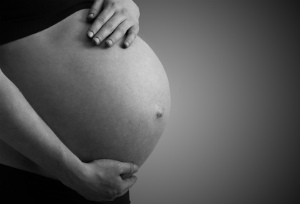
While you may not have missed your period, sometimes our bodies feel inexplicably “different.” Are these differences early signs of pregnancy, or just normal changes in how we perceive the inner-workings of our bodies, ones that have nothing to do with pregnancy?
Common Early Signs & Symptoms Of Pregnancy
It’s important to note that, without an accurate pregnancy test, there’s no definite way to tell whether or not you’re pregnant. The bottom line? If you think you’re pregnant, take a pregnancy test. You can purchase an at home pregnancy test from your local pharmacy, or visit your doctor for a blood test.
Most at home tests will provide accurate results one week after you’ve missed your period. But going to a doctor is definitely the best choice if you want to know for sure.
Even so, how do you know when its time to take a pregnancy test? If you are experiencing any, or several, of the following signs, it might be:
Spotting
After conception, a fertilized egg takes from 7 to 10 days to travel from the Fallopian tube to the uterus. When it arrives, it burrows into the uterine lining, in a process called “implantation” that can cause mild bleeding.
Implantation “spotting” is usually lighter in color than normal menstrual fluid, and occurs several days earlier than you would expect your period.
Changes In Your Breasts
Around 1 to 2 weeks after conception, the moment an egg is fertilized by sperm, many pregnant women experience changes in their breasts. Rises in certain hormone levels are pumping blood at an increased rate throughout your body, and a lot of it is going directly to your breasts. This can cause:
- Soreness
- Tenderness
- A “tingly” sensation
- Heaviness or “fullness”
- Darkening of the areola, the ring around your nipple
Visit Parents.com to learn more about the hormone progesterone and how it can affect your body during pregnancy.
What Else Causes Breast Tenderness?
Some women experience an increase in tenderness when a normal menstrual cycle approaches, so breast pain may not be a sign that you are pregnant. Many common birth control pills also cause a similar reaction, as they alter the natural hormone levels in your body.
Changes In Your Energy Level
Feeling fatigued, or overly tired, is very common and can begin as early as the first week of pregnancy.
Increased progesterone levels probably play a part in this symptom, too. But your blood sugar level is dropping, and sugar is your body’s primary source of energy. At the same time, your body is producing more blood. It’s doing more work, with less fuel. This combination of factors can also leave you lightheaded or dizzy.
What Else Causes Fatigue?
As you’ve probably noticed, there a lot of reasons to feel tired in addition to pregnancy. Stress, depression, even common colds and flus can all leave us without energy and drained.
Changes In Sense Perception
Most people are familiar with the food aversions that many pregnant women experience. Cravings for pickles and ice cream often crop up in cartoons and sitcoms. You might be experiencing sudden, intense cravings for a certain flavor, or be totally disgusted by a smell that never bothered you before.
What Else Causes Food Aversion?
Sometimes food aversion is simply an effect of being extremely hungry, or having an imbalanced diet. Stress and depression can also make certain smells and tastes less than ideal.
Headaches & Backaches
Increasing hormone levels often cause pain, most commonly headaches and lower back pain.
What Else Causes Pain?
For some women, pain is simply a sign of an impending menstrual cycle. Dehydration and caffeine withdrawal also cause headaches.
Changes In Urination Habits
Experiencing an urgent need to pee? It might be pregnancy hormones again. Increased levels of progesterone force blood through your kidneys, which in turn makes your bladder fill quickly. In fact, over the course of a pregnancy, the average woman’s blood supply increases by 50%, creating a lot more fluid that needs to be processed.
To learn more, visit Baby Center.
What Else Causes Increased Urination?
Urinary tract infections (UTI) also cause frequent urination, although this symptom is usually accompanied by a burning sensation. Liquids that contain diuretics, like coffee and sodas, inhibit hormones that regulate your kidney’s ability to process fluids, making you pee more often.
Morning Sickness
Morning sickness, the nausea that is so commonly associated with pregnancy, usually kicks in between 2 and 8 weeks after conception. No one really knows why morning sickness happens, although increases in hormone levels are suspected as playing a significant role.
Another thing? Morning sickness is a misnomer. In fact, most pregnant women experience nausea throughout the day, rather than just after getting up. Nausea can last an entire pregnancy, but disappears in many women after around 18 months.
The increased sensitivity to certain smells that we mentioned earlier may contribute to morning sickness. One recent study found that women who have no sense of smell (a condition known as “anosmia”), do not experience nausea during pregnancy.
What Else Causes Nausea?
Fear and stress can cause an upset stomach, as well as infections like the flu.
Changes In Breathing
As a baby grows, it begins to “share” many of its mother’s normal body processes. Fetus’ need oxygen, and tap into the supply coursing through your blood stream. Of course, this can leave you out of breath.
What Else Causes Shortness Of Breath?
Asthma, low blood pressure, and obesity can all cause shortness of breath, too.
Changes In Digestion
An increase in progesterone can cause your internal organs, including your digestive system, to “soften,” making room for a growing fetus. A common side effect of this is constipation and bloating.






Leave A Comment